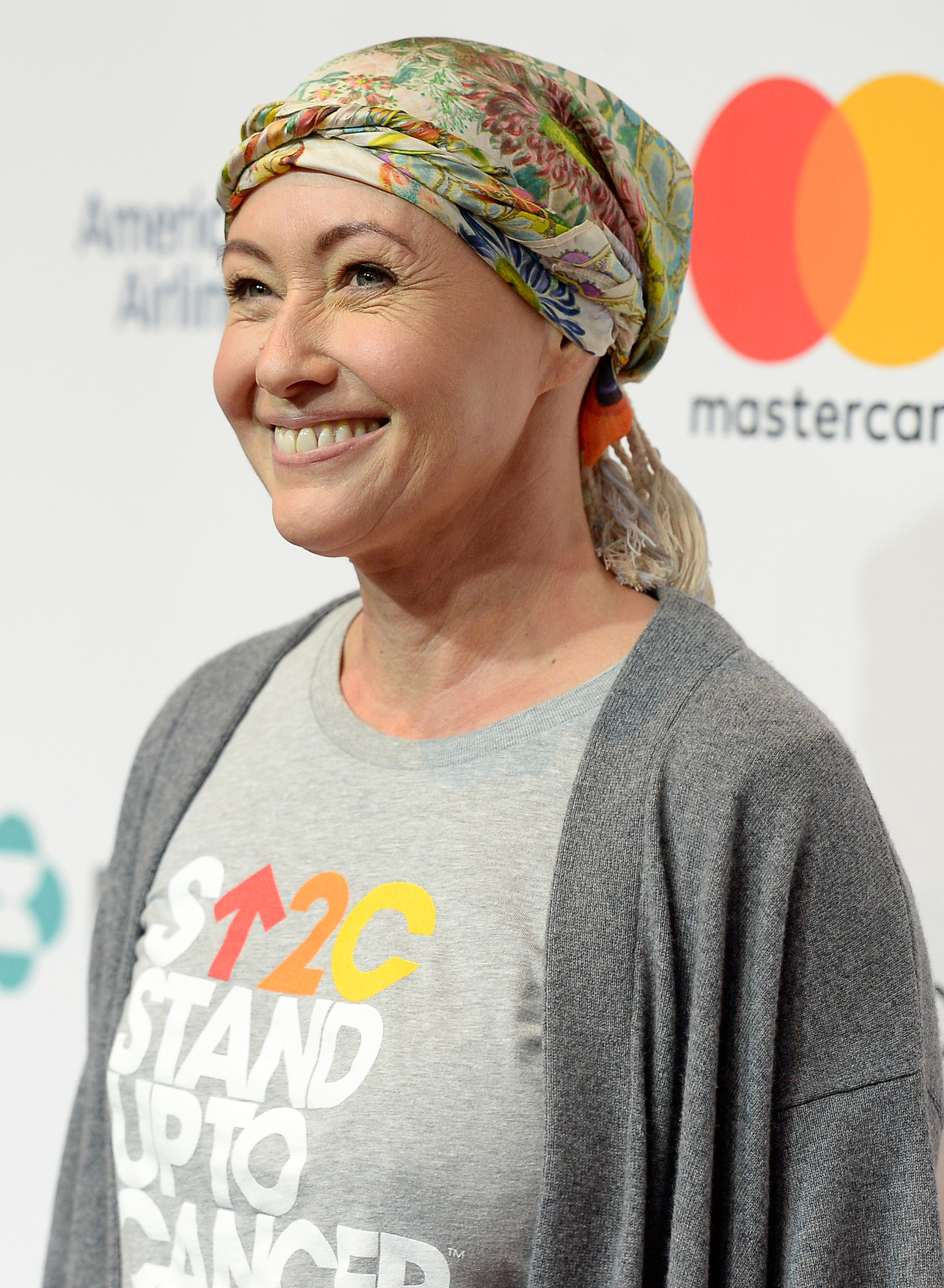Keeping Intimacy Alive After Cancer
- Actress Shannen Doherty, 52, says her sex life was upended following her breast cancer diagnosis. She says cancer treatments affected her libido and her relationship with her ex-husband.
- Many patients worry that their sex lives will be damaged or irreparable after cancer treatment. Although certain cancer treatments impact your hormones and can impact your libido, sexual function, and body image, help is available.
- Remember, a healthy sex life is possible after cancer treatment, and there are many products made specifically for people who have undergone treatment. These may include sex toys and lubricants for men and women.
- In many cases, the disruption in your sex life amid treatment is temporary and treatable. If you’re dealing with low libido and are unhappy with that lack of sexual interest, begin by having an open and honest conversation with your partner and your doctor to begin your journey to reclaim intimacy.
As actress Shannen Doherty, 52, continues to share candid details about her cancer journey on her podcast, she recently revealed how cancer impacted her sex life or lack thereof. She says cancer treatments caused her not to feel like her usual self and nearly killed her sex drive in the process.
“When [cancer] impacts your libido, when [cancer] meds take your libido away, or it makes things not as pleasant, like sex doesn’t feel as good,” Doherty said on her “Let’s Be Clear” podcast.

“I think it stayed in my bag for a really long time,” Doherty added.
She says at this stage in her cancer journey, she no longer feels the way she used to. However, she is open to dating moving forward.

RELATED: VA Care Insights: Sexual Function Recovery After Prostate Cancer Surgery
Many people diagnosed with cancer often worry about how their diagnosis and treatment will affect their sex lives. Talking about sex is a sensitive subject for most people and isn’t easy to discuss. On a positive note, your sex life isn’t ruined following a diagnosis. Although certain cancer treatments may alter a person’s approach to intimacy, that does not mean survivors cannot have healthy sex lives afterward.
Helping You Understand Late-Stage Breast Cancer
- Advances in Metastatic Breast Cancer Treatments Over the Last Year Offer New Hope for Those Fighting
- Are You A Metastatic Breast Cancer Patient Curious About The Drug Enhertu? Here’s What You Need To Know
- Do You Have HER2-Positive Metastatic Breast Cancer? Here’s A Breakdown Of Some Of Your Treatment Options
- FDA Approves Diagnostic Test to Identify Patients with Metastatic Breast Cancer Expressing Low Levels of HER2
Maintaining a Healthy Sex Life After Cancer
Many cancer patients worry their sex lives will be negatively impacted after treatment. It is true certain cancers impact hormones, causing changes to libido, sexual function, and body image. However, many products and helpful tips are available for people who have undergone treatment.
RELATED: ‘I’m Single and Have Psoriasis. How Does This Affect My Dating Life? What About Sex?’
“Sexual health is an extremely important part of our well-being and is often impacted by cancer,” licensed clinical psychologist Dr. Marianna Strongin tells SurvivorNet.
Dr. Strongin adds that some patients feel added pressure because of the impact their diagnosis has on their partner’s sexual desires. She insists on being as open and honest with your partner as possible.
“I always encourage my patients to communicate their worries and fears with their partners. Creating an open line of communication in regard to sex can actually create a new form of intimacy while building safety as you explore a new sexual relationship. As you disclose your new set of worries, remember that they also indicate your wants and desires. If you are insecure about “performing,” it also tells your partner that this brings you great pleasure, and together, you can create new ways to give and receive pleasure,” Dr. Strongin said.
RELATED: Women are Less Likely Than Men to Get Help for Sexual Dysfunction After Cancer Treatment
“It’s ok that you don’t feel like having sex,” says Dr. Kimberly Resnick, a gynecologic oncologist at MetroHealth in Cleveland.
“You’ve been diagnosed with cancer; you’re on chemotherapy…For the majority of our patients, there are many things happening to their body that can make them feel as if they don’t wish to be intimate anymore,” Dr. Resnick tells SurvivorNet.
Fortunately for many women, the disruption in their sex life is temporary and treatable. If you’re dealing with low libido and are unhappy with that lack of sexual interest, there are several things you can do to help get back in the groove with your partner.
Men also experience disruptions in their sex life amid cancer treatment. Men sometimes experience shame if they experience treatment side effects like erectile dysfunction.
Difficulty getting or keeping an erection is a common temporary or long-term side effect of some treatments for prostate cancer. But that doesn’t mean sex isn’t possible after prostate cancer.
If you’re having problems getting an erection, your doctor will probably have you try pills first. “Oral medications, like Viagra, Cialis, and Levitra, have been game-changers in this situation,” Dr. James Brooks, a urologic oncologist at Stanford Hospital and Clinics, tells SurvivorNet.
Another option is a vacuum constriction device. This is a cylinder that goes over your penis and uses suction to force blood into the penis and cause an erection. You then remove the cylinder and use a rubber ring to hold the erection. Some 80 percent of men who try it have success with this device.
Surgical implants, or penile prostheses, are available when other treatments don’t work.
Overcoming Discomfort
Cancer treatments can cause menopause or menopause-like symptoms; the sexual side effects can lead to both emotional and physical pain. To help, using lubricants and moisturizers can improve sensation. There are options for both non-hormonal moisturizers and low-dose estrogen moisturizers.
“A lot of times people feel like lubricants are the solution, and they are part of the solution, but they are not the entire solution,” Memorial Sloan Kettering clinical health psychologist and sexual health therapist Dr. Jeanne Carter tells SurvivorNet.
“When you don’t have estrogen, you usually are not having moisture in the vagina, as well as on the vulva.”
How to Reclaim Intimacy
Whether it is trying new things in the bedroom or seeking help from a sex therapist or peers in a support group, there are many options for women and men seeking all different types of support to reclaim intimacy despite their diagnosis.
It’s important to remember that intimacy doesn’t have to equal sex if you aren’t missing sex to begin with. “We know that for ovarian cancer patients, simply by having a partner, women have better outcomes,” says Dr. Resnick. “And it likely has to do with being able to have some shared intimacy with someone and not feeling alone.”
If sex is a big part of the intimacy factor in your relationship and you want to start having it again, there are several solutions your doctor can help you with.
Dr. Resnick recommends doing whatever you can to help you relax. Make sure you’re in a comfortable environment. The first time having sex after a hiatus is not the time to get adventurous. Where you can think a little out of the box is with sex toys.
“A vaginal dilator or other sex toy prior to intercourse can help you learn how to relax the vaginal muscles again,” says Dr. Resnick.
If you’re dealing with vaginal dryness and are nervous about sex being painful, make sure to use enough lubricant. If you’re unsure which type to buy: water-based, oil-based, or silicone-based, ask your doctor for advice.
Finally, make sure to discuss intimacy and sex with your doctor, and don’t be shy about bringing it up if they don’t do so proactively. This is part of your treatment, and your doctor should be able to help you cope with the emotional and physical effects of reclaiming intimacy.
Doherty’s Cancer Journey
Shannen Doherty’s initial breast cancer diagnosis arrived in 2015 after she discovered a lump in her breast. For treatment, she had hormone therapy, a single mastectomy (the removal of all breast tissue from one breast), chemotherapy, and radiation.
In 2017, she achieved remission status, but the disease returned two years later in 2019. This time around, her breast cancer was metastatic, or stage 4.

Having metastatic breast cancer means the cancer has spread, or metastasized, beyond the breasts to other parts of the body. It often spreads to the bones, liver, and lungs but can also spread to places like the brain.
While treating advanced breast cancer, the goal of treatment is to keep you as stable as possible, slow the tumor growth, and improve your quality of life.
WATCH: Aggressive breast cancer in younger women.
As cancer treatments improve year over year, so does the number of people battling this form of cancer that spreads to the brain, says Dr. Michael Lim, who is the Chair of the Department of Neurosurgery and a board-certified neurosurgeon specializing in brain tumors at Stanford Medicine.
According to Dr. Kimberly Hoang, a board-certified neurosurgeon at Emory University School of Medicine, a craniotomy procedure like Doherty underwent earlier this year is “a procedure to cut out a tumor” on the brain that may be particularly useful “if the tumor is causing symptoms or if it’s large.”
Since undergoing brain surgery, Doherty has focused on enjoying precious time with loved ones as she continues battling stage 4 cancer.
Doherty’s cancer then spread, or metastasized, to her brain and then to her bones. As a result, she’s undergone both radiation and surgery in the form of a craniotomy to improve her prognosis.
Learn more about SurvivorNet's rigorous medical review process.
